Turkey’s Constitutional Court does the right thing!
Jul 31st, 2008 | By Citizen X | Category: Countries of the World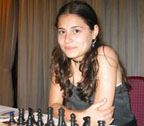 Just when it seemed that the encouraging, moderate, and essentially rational new Islamic democracy in Turkey might be about to blow apart, wiser heads have prevailed. And there are at least some fresh grounds for hope about the future of the troubled global village today.
Just when it seemed that the encouraging, moderate, and essentially rational new Islamic democracy in Turkey might be about to blow apart, wiser heads have prevailed. And there are at least some fresh grounds for hope about the future of the troubled global village today.
Headlines from more or less around the world tell the story: From the Globe and Mail in Canada – “Turkey’s governing party narrowly avoids ban … Ruling strikes balance between country’s radical secularists and AKP’s moderate Islamic constituency” ; from The Australian – “Turkey’s ruling party escapes court ban … Turkey stepped back from the brink of political turmoil yesterday when the ruling party narrowly escaped closure over its alleged Islamist tendencies” ; from the Los Angeles Times – “Turkey court decides against ban on ruling AKP party … Turkey’s highest court Wednesday decided against outlawing the ruling party, which had been accused of attempting to advance an Islamist agenda in officially secular Turkey”; and finally from Hurriyet in Turkey itself: “Turkish court’s decision a warning for ruling party, it’s now AKP’s turn … Constitutional Court … verdict is a serious warning that could spark … problem for the ruling party’s image.”
(And if I can be allowed my own brief editorial comment: I’m happy that the good vibes I thought I felt on the streets of Istanbul and Izmir this past fall were not entirely unreal. Three cheers for Turkish civility and common sense.)
More from the Globe and Mail …
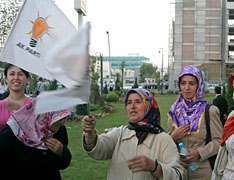 “Turkey’s Constitutional Court fell just one vote shy of outlawing the ruling Justice and Development Party (AKP) on charges of anti-secularism. The judgment ends a three-month period of suspense, intrigue and violence, highlighted by an alleged coup plot and a deadly terrorist attack this week in Istanbul that many believe was related to the pending court ruling.
“Turkey’s Constitutional Court fell just one vote shy of outlawing the ruling Justice and Development Party (AKP) on charges of anti-secularism. The judgment ends a three-month period of suspense, intrigue and violence, highlighted by an alleged coup plot and a deadly terrorist attack this week in Istanbul that many believe was related to the pending court ruling.
“It marks a turning point in a decade-long showdown that has seen the staunchly secularist army and courts facing off against a new, moderately Islamic middle class that has come to dominate Turkey’s economy and society during that time, ending the country’s nationalist isolationism and pushing Turkey to join Europe, embrace free trade and end its conflicts with ethnic minorities.
“The ruling, which also cut off half of the AKP’s state funding, was seen by Turkish observers to strike a balance between the radical secularism that has governed Turkey for eight decades and the popularity and economic success created by the AKP, allowing both to remain intact. If so, it represents a very new sort of thinking in a country that has usually solved such disputes by having the military seize power.”
More from The Australian …
“After three days of deliberations, six of the 11 judges in the country’s Constitutional Court voted to ban the Justice and Development (AK) party, led by Prime Minister Recep Tayyip Erdogan. Seven votes were needed for a majority verdict.
“Instead, the court decided to cut the party’s Treasury funding for this year by half – amounting to a slap on the wrist for AK, which stirred controversy by promoting Muslim headscarves.
“The court’s chairman insisted the fine was a warning. I hope the party in question will evaluate the outcome very well and get the message it should get,’ said Hasim Kilic, the only judge to vote to reject the case.”
More from the Los Angeles Times …
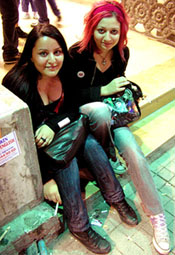 “The narrow verdict, which came after three days of closed-door hearings, averted what could have been a drawn-out political crisis but did little to address fundamental tensions between religiously observant Turks and their more secular-minded compatriots.
“The narrow verdict, which came after three days of closed-door hearings, averted what could have been a drawn-out political crisis but did little to address fundamental tensions between religiously observant Turks and their more secular-minded compatriots.
“In its ruling, the Constitutional Court penalized the Justice and Development Party, known by its Turkish initials, AKP, with financial sanctions that represent a loss of about half the party’s subsidy from the government treasury. But the penalty was not expected to significantly curtail the AKP’s ability to function because the shortfall can be made up at least in part by private donations.
“The verdict was greeted with evident relief by the AKP. Cabinet minister Faruk Celik called it a victory for Turkish democracy. The party had steadfastly denied the charges and said they were politically motivated.”
More from Hurriyet in Turkey …
“Observers say the ruling represents a third way’ which was signaled by the Court’s Chairman Hasim Kilic two months ago.
“Kilic has told the Referans business daily in May: Believe me whatever the ruling is, you all see that our democracy, secularism and legal institutions would come out of this process stronger. And believe me this is not a wishful thinking!’
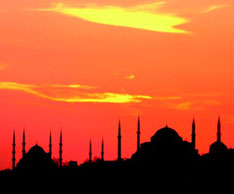 “And he said on Wednesday everybody should make necessary efforts to reduce political tension in Turkey from now on and urged political parties to take the legal steps for toughening party closure conditions.
“And he said on Wednesday everybody should make necessary efforts to reduce political tension in Turkey from now on and urged political parties to take the legal steps for toughening party closure conditions.
“The message and the details of the ruling of the Constitutional Court should be read carefully.
Six of the 11 members said the AKP had become the focal point of anti-secular activities; one member, the chairman Hasim Kilic, said the case should be rejected and the remaining four members also admitted that the party is focal point of anti-secular activities but not in an extent to deserve to be banned.
“In other words 10 members of the Court said AKP had taken steps that harm the secularism principle in the country. That’s why the ruling is a serious warning’ for the governing party, as Kilic said, and its activities would continue to be monitored by state organs.
“The AKP had been convicted for committing a crime against secularism by the 10 of the 11 members of the Constitutional Court. So that the AKP was not acquitted by the Constitutional Court,’ Murat Yetkin, Radikal‘s Ankara bureau chief said on Thursday.
“He said Prime Minister Tayyip Erdogan and the AKP should now think twice before taking any steps, because every action of the ruling party would be assessed under the shadow of the court’s ruling.”
July 29: ISTANBUL BOMBINGS RAISE FEARS FOR AN ISLAMIC DEMOCRACY THAT WORKS?
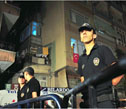 “Two bombs exploded minutes apart in a packed Istanbul square” on the night of Sunday, July 27, “killing 17, five of them children, and injuring more than 150 in the deadliest attack against civilians in Turkey in almost five years.” What is most alarming about this senseless destruction is the prospect that it somehow signals the end of a brave Turkish experiment in a kinder and gentler Islamic democracy – which as the Middle East journalist Christopher de Bellaigue urged last fall, “holds out the promise of a free public culture, equally open to devout Muslims, secularists, and critics of Turkey’s past politics-something the country has never known.”
“Two bombs exploded minutes apart in a packed Istanbul square” on the night of Sunday, July 27, “killing 17, five of them children, and injuring more than 150 in the deadliest attack against civilians in Turkey in almost five years.” What is most alarming about this senseless destruction is the prospect that it somehow signals the end of a brave Turkish experiment in a kinder and gentler Islamic democracy – which as the Middle East journalist Christopher de Bellaigue urged last fall, “holds out the promise of a free public culture, equally open to devout Muslims, secularists, and critics of Turkey’s past politics-something the country has never known.”
The biggest trouble is that the July 27 bombings have come “on the eve of a major court case … that could lead to the closure of the governing Justice and Development, or AK party.” And the “bombings and the legal challenge to the government highlight a growing mood of uncertainty in Turkey, where an Islamic-oriented government that won a strong mandate in elections last year is locked in a power struggle with secular circles in the military and judiciary.” The chances that this struggle will suddenly break wide open now seem disturbingly greater than when six people were gunned down in front of the US Consulate in Istanbul, just this past Wednesday, July 9.
Who did it … the Kurdish separatists in the PKK?
As of July 29 in North America, it remains unclear exactly who is responsible for the July 27 bombings in Istanbul.
From the start government officials have seemed to want to blame Kurdish separatists in Turkey (who also unfortunately live next door, as it were, to the Kurds in northern Iraq). As reported by the Associated Press yesterday: “Prime Minister Recep Tayyip Erdogan served as a pallbearer at a funeral Monday for some of the 17 people killed by bombs in Turkey’s biggest city, an attack the government blamed on Kurdish rebels who have targeted civilians in the past.”
At the same time, the “rebel Kurdistan Worker’s Party [PKK] immediately denied responsibility and attributed Sunday’s attack to dark forces’ – hard-line Turkish nationalists who allegedly seek to foment chaos to strengthen the political influence of the military… Turkey is home to a variety of violent groups besides the PKK, including Islamic extremists and alleged coup plotters with ties to the secular establishment.”
Prime Minster Erdogan has nonetheless “said the bombings … appeared to be a reprisal for air raids on PKK positions in northern Iraq, as well as a cross-border ground offensive by the Turkish military in February.” And today Agence France-Presse has reported that: “Police studying surveillance videos identified a possible suspect … as Turkish warplanes bombed Kurdish rebels in northern Iraq … Officials have accused the separatist Kurdistan Workers’ Party … The police, who have established a description of the terrorist… are working on the presumption that he came alone from the Qandil mountains … where the PKK has its main stronghold.”
Who did it … the “shadowy Ergenekon’ nationalist group?
 The PKK’s own theory that “dark forces” are behind the attack apparently puts a particular finger on the “shadowy Ergenekon’ nationalist group, which is alleged to have organised attacks and plotted assassinations to foment political turmoil and pave the way for a military coup against [Prime Minister] Erdogan’s [current Turkish] government.”
The PKK’s own theory that “dark forces” are behind the attack apparently puts a particular finger on the “shadowy Ergenekon’ nationalist group, which is alleged to have organised attacks and plotted assassinations to foment political turmoil and pave the way for a military coup against [Prime Minister] Erdogan’s [current Turkish] government.”
The government has been investigating Ergenekon since last summer, “when it was allegedly discovered that a house in the mraniye district of Istanbul was being used as a storehouse for arms and ammunition.”
The investigation gathered steam late this past January, when 33 of Ergenekon’s ” alleged members were seized in a police raid … The claims [about the organization] widely reported in the Turkish press ever since read like a thriller … They allege the gang was plotting to bring down the government … It is claimed their plan was to assassinate a string of Turkish intellectuals, including Nobel Laureate Orhan Pamuk, fomenting chaos and provoking a military intervention in 2009.A menu’ of targets had already been drawn up and a hitman hired when the police swooped, according to the daily Hurriyet. Sabah newspaper linked the gang to the … murder of three Protestant Christians and Turkish-Armenian journalist Hrant Dink. Those details – apparently leaked by police – have never been officially confirmed.”

“No one is claiming responsibility for the bombs in Istanbul, but the finger of suspicion points at a shady ultra-nationalist group … there are close links between Ergenekon and the closure case at the top court; and between Ergenekon and the PKK … The evidence listed in the Ergenekon indictment, which has been covered enormously in Turkish media in recent days, oblige us to think that the last terrorist attack is linked with Ergenekon irregardless of whether it was perpetrated by the PKK, Hizbullah, the DHKP-C or the IBDA-C. Because I think the attacks aim at deterrence and intimidation of those officials who want to chase the trail of Ergenekon wherever it leads …
“Hopefully, these terrorist acts have no chance at reversing the Turkish people’s eagerness to make Turkey a much more transparent and much more democratic country. Because the overwhelming majority of the Turkish people want a more transparent, more democratic regime, the attacks, fortunately, do not bear the potential to deter the Turkish people from these demands.”
Where is the court case going?
As noted earlier, the biggest trouble in Turkey right now would seem to be that the July 27 bombings have come “on the eve of a major court case … that could lead to the closure of the governing Justice and Development, or AK party.”
As Bulent Kenes urges, “there are close links between Ergenekon and the closure case at the top court.” Or, it would seem, the court case is a kinder and gentler way of trying to do the same thing that Ergenekon wants to do – i.e. get rid of the current AK party government led by Recep Tayyip Erdogan, on the grounds that it is what Christopher de Bellaigue last fall called a “Trojan horse for Islamism as severe as one finds in Iran or Saudi Arabia.”
(Though Mr. de Bellaigue, it should be noted, does not agree with this characterization of the Erdogan government himself. Like Mr. Kenes, he sees it as much more in tune with the “Turkish people’s eagerness to make Turkey a much more transparent and much more democratic country.” And, again, the government did win a “strong mandate in elections last year.”)
In this sense both Ergenekon and the court case are inspired by the aggressively secularist ideals of Kemal Ataturk, who founded the modern Turkish republic in the 1920s, with the help of a military elite that still sometimes sees itself as a guardian of these ideals.
(And these ideals, it might be said, have had both positive and negative sides in Turkey’s subsequent development. Ataturk was for science and progress, and he laid some key institutional foundations for Turkish democracy today. He arguably over-relied on military force to help implement his reforms, however, and like Ergenekon in 2008, “Kemalism” in the 1920s and 1930s also had some lamentable fascist overtones.)
The details of the current court case have been briefly explained in the New York Times. A prosecutor of Turkey’s high or constitutional court “has accused … [Prime Minister Erdogan’s governing AK] party of bringing Islamic practices into politics to replace the secular regime with a more religious one, in violation of the founding principles of the Turkish republic … If found guilty, 71 senior members of the party, including the current president and the prime minister, could be banned from politics for five years. The court is expected to reach its verdict in a couple of weeks.” (And the great fear is that if the verdict is guilty, who knows what will happen in Turkish politics … to say nothing of the Turkish armed forces, and on and on and on?)
Good news and bad news?
 Two pieces of more or less good news have just surfaced in the midst of these current Turkish troubles:
Two pieces of more or less good news have just surfaced in the midst of these current Turkish troubles:
First, from the Telegraph in the UK: “Istanbul bombing does little to deter British holidaymakers … Travel companies and tour operators report no concerns from customers following Sunday’s bomb attack in the Turkish capital [well technically Ankara not Istanbul is Turkey’s capital city] … Last week Telegraph Travel reported that Turkey has overtaken Spain as Britons’ most popular tourist destination … Meanwhile, Thomas Cook said that, although it was still early, there had been no worried callers. The tour operator said that it will be offering the same advice as the Foreign and Commonwealth Office (FCO) … The FCO website makes special mention of Sunday’s attack, which left 17 dead and more than 150 injured, while commenting that the risk of terrorism in Turkey is “high”, with targets including tourist areas. However, its advice is identical to that offered on other popular holiday spots such as Spain and Morocco.”
And second, from Reuters India: “Turkish markets rise on improved political outlook … Turkish equities jumped on Tuesday [July 29] for the second day in a row as investors bet that a top court would not close the ruling AK Party on charges of seeking to introduce Islamic law in Turkey. The bounce was in contrast to emerging equities elsewhere, which hit their lowest since August 2007 on the back of ongoing problems in the Western financial sector … Istanbul’s main stock index .XU100 gained 2.71 percent on Tuesday rising to 39,153.74 points … Turkish stocks were in negative terrain during the exchange’s first trading session before the release of a JP Morgan report upgrading Turkish stocks …in their ideal portfolio and [urging] that the chance for a market-positive outcome to the Constitutional Court closure case was 80 percent.”

“Turkey has long been full of rumours of violent patriotic’ gangs. By offering harder evidence than before of links between violent groups at opposite ends of the ideological spectrum, the Ergenekon case has sparked unprecedented soul-searching in a country that once saw the state as a largely benevolent father … In private, everybody talks about alleged links to the PKK.” As one student of the subject has claimed, “Ergenekon and the PKK have different aims, but they’re both terrorist gangs. Of course they could work together …
“A columnist for Turkey’s most influential daily, Cuneyt Ulsever, went a step further. Call me paranoid, but I think Ergenekon did this,’ he said. These are wild times for Turkey, the wildest I have ever seen. God knows where we are going.'”
July 9: GUNFIGHT AT THEÂ ISTINYE CORRAL .. what are killings at US Consulate in Istanbul telling us?
 Probably the first thing to remember about the three gunmen and three police officers who were killed in front of the US Consulate in Istanbul on Wednesday, July 9, 2008 is that violence of this sort is hardly unprecedented in the fabled former Constantinople and before that Byzantium – ancient glittering jewel of the near (or middle?) east, between the Mediterranean and Black seas.
Probably the first thing to remember about the three gunmen and three police officers who were killed in front of the US Consulate in Istanbul on Wednesday, July 9, 2008 is that violence of this sort is hardly unprecedented in the fabled former Constantinople and before that Byzantium – ancient glittering jewel of the near (or middle?) east, between the Mediterranean and Black seas.
The present fortress-like US Consulate, perched on a hill in the suburban Istanbul neighbourhood of Istinye, was itself constructed “after Islamic militants linked to al-Qaeda carried out suicide bombings in [November] 2003 that targeted two synagogues, the British Consulate and a British bank in Istanbul.” And: “Those attacks killed 58 people.” Similarly, another “four people were killed and 15 wounded in an explosion in Istanbul in June 2004, before President George W. Bush visited the city.” The most remarkable point about the latest July 9, 2008 killings is almost certainly how promptly Turkish authorities contained the violence. And the greatest international grief must be reserved for the three Turkish officers who gave their lives in defence of civil order and the democratic rule of law.
1. The US Consulate in Istinye … 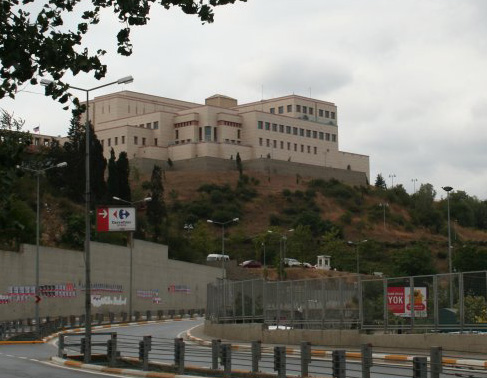
The still rather new US Consulate building in Istanbul itself says some interesting enough things about the state of the global village nowadays. It has been charitably described by a Turkish source as “an imposing structure on a hill in Istinye, a densely residential neighborhood along the Bosporus Strait on the European side of Istanbul.”
Before the 2003 assault on the British Consulate in Istanbul, the US Consulate had a more downtown location. The US State Department hints broadly at the concerns behind the new structure in a more suburban location: it “has fortified walls, security checkpoints and barriers set far from the building.”
At the still rather new facility, this past June 24June 26, the “Turkish Ministry of Justice and the US Department of Justice jointly organized a first-of-its-kind roundtable of practitioners and experts to discuss international terrorist extradition issues …Top prosecutors and judges from Turkey, the United States, Austria, Belgium, Denmark, France, Iraq, the Netherlands, Spain and Switzerland engaged in extensive and open discussion about international requirements, practical considerations and best practices in overcoming legal obstacles inherent in extraditing terrorists.”
Several days later, “Consul General Sharon A. Wiener welcomed 2000 guests to the [US] Consulate in Istinye to celebrate the two hundred thirty-second anniversary of the Declaration of Independence of the United States of America. Over 2000 mostly Turkish distinguished guests enjoyed American fare donated by local outlets of American restaurants at the Consulate’s largest event of the year.”
A much less official but still instructive view comes from a blog written by a teacher from Seattle, Washington, recounting his “adventures visiting my good friend Ned in Istanbul during July of 2007.” (And Ned, it should be noted, is also a citizen of the USA, about to get married to someone suitable enough, it would seem, while remaining in Istanbul:
“Today, Ned and I took a bus most of the way up the Bosporus to the neighborhood of Istinye in order to visit the American Consulate. Ned had to fill out a piece of paperwork that essentially asserts that he’s not married. This is the first step in getting married in Turkey when you’re an American (whether you’re marrying a Turk or not, it doesn’t matter) … When we arrived in Istinye, we inquired about the location of the US Consulate. A local directed us toward a busy street that led up into the hills. Ned didn’t know exactly what to expect, but he’d heard that the consulate is a very large and brutal looking building. We rounded a corner and, sure enough, on the hillside up ahead was one of the ugliest buildings I’ve ever seen … The consulate is not really designed to be accessible by foot – typically American I suppose.”
2. Known details of July 9 killings so far …
As of my writing here, no one has yet claimed responsibility for the July 9 attack on the very large and brutal looking US Consulate in Istinye that Ned and his old friend from Seattle visited last summer. A Turkish source offers the following report:
“Three unidentified gunmen and three Turkish policemen were killed Wednesday in an attack on a police guard post at the main entrance of the well-fortified US Consulate in Istanbul that officials labeled a terrorist’ act. One person has been taken into custody …
“The three assailants jumped from a car and opened fire at the police checkpoint around 11 AM (0800 GMT), officials told reporters, adding that they also fired shots at the building. The security forces returned fire, killing all three gunmen …
“There is no doubt that this is a terrorist attack,’ Istanbul Gov. Muammer Guler said … Police identified the perpetrators of the armed attack, Guler told reporters after visiting wounded police officers at a local hospital, adding all current evidence indicates that three of the assailants who were killed during the attack were of Turkish origin …
“Yavuz Erkut Yuksel, a bystander, told CNN-Turk television the attackers emerged from a white vehicle and surprised the guard … One of them approached a policeman while hiding his gun and shot him in the head,’ Yuksel said …
“Guler said two of the attackers were Turkish nationals. [This somewhat contradicts three of the assailants who were killed during the attack were of Turkish origin’ above, but that is what the source says.] Police were pursuing a fourth attacker who reportedly escaped in a car … A US Embassy spokeswoman said there were no reports of casualties among American consulate employees, but could not confirm Turkish media reports of injuries and deaths.”
According to the Reuters news service, as cited by Yahoo Canada: “Turkish broadcasters CNN Turk and NTV said, without citing sources, that the three gunmen from east Turkey were suspected of being members of al Qaeda.”
Some further details from Reuters and other sources appear in a Times of London report: “Ulus Durgut, 24, who was in the process of entering the [US Consulate] compound, said the gunbattle lasted 15 minutes. The terrorists were bearded men and had long hair,’ Mr Durgut told Reuters. Mutlu Gunes, a 13-year-old eyewitness, said that he was on his way to a mosque when he spotted several men preparing guns and placing them inside a Ford Focus car before driving to the nearby consulate … The three of them got out of the car. One of them shot a policeman in the chest and I saw one terrorist killing himself after being shot by police. Then I hid under a car,’ he said.”
3. Meanwhile, Kurdish radicals kidnap three German climbers on Mount Ararat in “Agri province, which borders Iran”
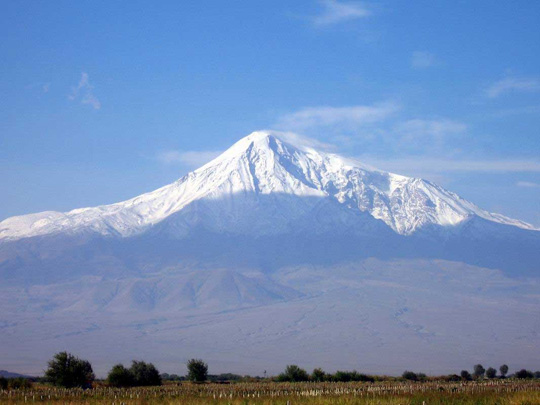 Especially since the start of the US War in Iraq , the threat of periodic Turkish incursions into the Kurdish-dominated northern regions of Iraq, where Turkish Kurd separatists and terrorists of the Kurdistan Workers Party (PKK) are thought to seek haven, has been a source of potential instability in the wider region.
Especially since the start of the US War in Iraq , the threat of periodic Turkish incursions into the Kurdish-dominated northern regions of Iraq, where Turkish Kurd separatists and terrorists of the Kurdistan Workers Party (PKK) are thought to seek haven, has been a source of potential instability in the wider region.
Intriguingly enough, on July 9, 2008 as well: “On a day of instability in Turkey, it emerged that Kurdish guerrillas had kidnapped three German tourists on a climbing expedition in eastern Turkey … The three tourists had established a camp on Mount Ararat in Agri province as part of a 13-member climbing team when they were seized by a group of Kurdistan Workers Party (PKK) militants, the state-run Anatolian news agency reported …
“If the PKK is proven to have carried out the kidnapping, it would be a rare tactic for the separatist group whose activities are mainly focused on attacking military targets in southeast Turkey …. [The state-run Anatolian news agency] reported Agri Governor Mehmet Cetin as saying the climbers had arrived in the region three days ago and had established a camp at a height of 3,200 metres (10,500 feet) on the mountain … Five PKK militants approached the camp and chose three people to kidnap, he said. Their identity was not clear. Agri province, which borders Iran, is to the north of the main PKK conflict region and is a popular destination for mountain climbers …
“The terrorists said they carried out this action because of the German government’s recent moves against PKK associations and sympathisers,’ [the state-run Anatolian news agency] reported the governor as saying … Last month Germany banned Kurdish television station Roj TV, which Interior Minister Wolfgang Schaeuble described as being a mouthpiece for the PKK. Germany also extradited two PKK militants to Turkey last year.”
And what about the recent “Arrests in alleged plot to topple Turkish government”?
 All news about trouble of any sort in Turkey is bound to distress you somewhat, if, on the basis of a very short visit last fall – just after the Seattle school teacher’s “adventures visiting my good friend Ned in Istanbul during July of 2007” – you have concluded that the Republic of Turkey today is the world’s best hope for some kind of functioning Islamic democracy. (Which even or especially if you have absolutely no faith in the cheerleader political theories of George W. Bush, could still be a very useful thing in the global village today, if you live in and value any other kind of democratic country – Canada, say, or Australia, and India, etc., along with the USA, UK, European Union, and all that.)
All news about trouble of any sort in Turkey is bound to distress you somewhat, if, on the basis of a very short visit last fall – just after the Seattle school teacher’s “adventures visiting my good friend Ned in Istanbul during July of 2007” – you have concluded that the Republic of Turkey today is the world’s best hope for some kind of functioning Islamic democracy. (Which even or especially if you have absolutely no faith in the cheerleader political theories of George W. Bush, could still be a very useful thing in the global village today, if you live in and value any other kind of democratic country – Canada, say, or Australia, and India, etc., along with the USA, UK, European Union, and all that.)
As matters stand, modern Turkey has a history of rather aggressive military-backed secularism since the break-up of the old Ottoman empire in the 1920s – onto which an apparently quite mild and more or less rational-seeming Islamic government has most recently been grafted. There is still significant tension between these two secular and religious streams of contemporary Turkish culture. And while walking about in downtown Istanbul can be a quite benign and encouraging experience, there are still those who fear that this tension could get out of hand – again, as it has from time to time in the past.
Thus this past July 6, 2008 the Associated Press told us: “Turkey has reportedly arrested two retired generals as part of an investigation into an alleged plot to topple the Islamic-rooted government…. The state-run Anatolia news agency reports today that Hursit Tolon and Sener Eruygur were among 21 people rounded up and questioned earlier in the week in a probe into an alleged coup plot by secularists … Turkish authorities arrested the head of the capital’s business chamber late Saturday as part of the same investigation …
“The probe into the alleged pro-secular and nationalist network called Ergenekon’ began last year and dozens, including some of the government’s fiercest critics, have been detained so far…. No indictments have been issued and no trial date has been set … Details of the alleged plot are sketchy but some newspapers close to the government have said the suspects were plotting a series of events such as mass demonstrations and violent clashes with police that would lay the groundwork for an army takeover.”
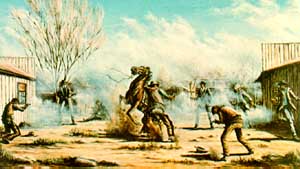 There as yet seems no suggestion that the somewhat quixotic July 9 attack on the US Consulate in Istanbul by three gun-slinging “bearded men” with “long hair” – who were also “from east Turkey” and “suspected of being members of al Qaeda.” – had anything to do with the reported recent arrests of ” two retired generals as part of an investigation into an alleged plot to topple the Islamic-rooted government.”
There as yet seems no suggestion that the somewhat quixotic July 9 attack on the US Consulate in Istanbul by three gun-slinging “bearded men” with “long hair” – who were also “from east Turkey” and “suspected of being members of al Qaeda.” – had anything to do with the reported recent arrests of ” two retired generals as part of an investigation into an alleged plot to topple the Islamic-rooted government.”
But who really knows about such things with any great confidence, of course, of course? And it could even be (maybe?) that, given the alleged vast success of the recent US “surge” in Iraq (just ask John McCain etc), the “bearded men” with “long hair” who nowadays dominate al Qaeda (maybe again?) have thrown over their heretofore extremely successful suicide-bombing tactics in favour of the great American traditions of the Gunfight at the OK Corral. (Which would seem to be just the sort of thing the new very large and brutal looking US Consulate on top of the “hill in Istinye, a densely residential neighborhood along the Bosporus Strait on the European side of Istanbul” is designed to handle. Or something like that … )
Citizen X’s earlier report “A Day in Istanbul” appeared in counterweights on Thursday, October 25, 2007.
UPDATE JULY 12: According to a report in the New York Times:
“Turkish police have now detained 10 suspects in the armed attack on the United States Consulate on Wednesday that killed six people, the governor of Istanbul said Friday.
“Three policemen and three assailants were killed in a gunfight in front of the consulate. A fourth escaped in car, which the police found abandoned in a remote neighborhood in Istanbul late Thursday. The suspected driver is among those detained.
“Gov. Muammer Guler said the suspected driver had been interrogated at length.
“His interrogation lasted until morning,’ Mr. Guler said in a statement to the semiofficial Anatolian news agency. There may be additional detentions in light of this interrogation. Of course, there is no longer any doubt that it was a suicide type of attack,’ he said.
“Several media outlets have raised the possibility that Al Qaeda was involved, but Mr. Guler declined to comment on any links.
“The utmost attention is being paid, especially to the international links of one of the persons involved in the terror attack,’ Mr. Guler said. In terms of a name of an organization, we cannot say anything since we haven’t confirmed it, but of course there is work to be done on the groups mentioned.'”
UPDATE JULY 10: According to a Reuters report earlier today:
“Police were still looking for the fourth man in the squad, who escaped from the scene in a car during the gunbattle between the gunmen and police.
“The attack coincides with political tension in Turkey. The governing party is fighting to avoid being banned for alleged anti-secular activities and police are probing a shadowy far-right group suspected of plotting a military coup … .
“But there was skepticism among security experts that al Qaeda was behind the assault on the consulate, given the small scale and amateurish nature of the attack … .
“In Turkey’s eastern Igdir province, friends and relatives of one of the dead gunmen, named as Bulent Cinar, expressed shock at his involvement, the state-run Anatolian news agency said.
“Bulent was a good boy. We were shocked when we heard what happened. I can’t understand how he could do such a thing. He was definitely deceived,’ said Erhan Karaboga, a friend of his.”
According to a subsequent Reuters report:
“Turkish police on Thursday detained the suspected driver of the car used in an attack on the U.S. consulate in Istanbul this week, in which 6 people were killed, media reports said.
“The car had also been seized and the driver was being questioned at police headquarters, CNN Turk reported.
“Earlier in the day, police detained four other suspects.
“Interior Minister Besir Atalay described the incident on Wednesday, in which three policemen and three gunmen were killed, as a suicide attack.”

